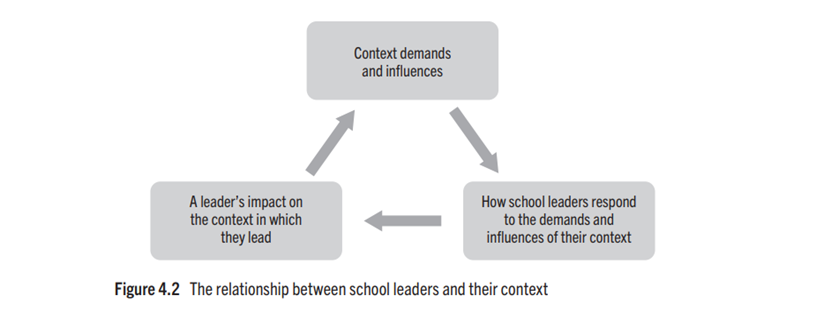Ecosystem Leadership: an approach for schools, written by Neil Barker, provides practical, hands-on activities and templates to assist school leaders in developing collective leadership skills and practices. Drawing inspiration from the interconnected ecosystems found throughout the natural world, Barker sets out 5 key leadership elements for school leaders to address: context, vision, processes, focuses and impact. In this exclusive extract from the book, Barker is discussing the importance of understanding your school’s unique context, and creating a leadership approach that is aligned with the needs, interests and aspirations of that school community.
The way we live our lives is intricately connected to the world around us. We make use of transport, food and health services to travel, eat and stay healthy; we meet with family, friends and colleagues to interact socially; and we participate in adventure, art and sporting events for fitness and entertainment. We are creatures of our environment, influenced by and influencing the ‘context’ in which we live. There is a complex interplay between us and our environment, a two-way street of influence and impact. While each of the interconnections we have will vary in terms of scale, duration and importance, and be unique for everyone, we are inextricably connected.
Clearly, the context in which we operate matters. To ignore it, or to take little account of the world around us will have implications for how well we live, survive and thrive within that context, and will have consequences of varying degrees for our communities and environments. My working life has been one of change and diversity across the education sector. I have taught in primary and secondary schools, at the Melbourne Zoo and in juvenile justice. I have worked in policy and procurement units, and I have been the director of an education leadership institute. I have loved all my roles and disliked them in equal measure at various times. I have been bored and challenged and annoyed and frustrated; sometimes all in one day! Of course, each organisation and each unit or team I worked in was different (as they are for most of us) and required me to adjust the way I led. But did I adjust adequately to each context? Did I adjust daily, weekly, monthly? Did I adjust because I was made to, because I wanted to or because I needed to? Was I a good fit for all the leadership tasks or roles I undertook? Was I appointed to those roles because of my ‘fit’?
Context is a complex area of consideration; as leaders we ignore it at our peril. Leadership that does not account for the circumstances of an organisation’s internal and external conditions risks operating in ways that neglect opportunities to maximise its impact, or worse, operate in opposition to the prevailing conditions that exist. To use a natural ecosystem analogy, leadership that does not account for its context risks being ‘like a fish out of water’.
Natural ecosystems are not just connected to the elements within and around them, they are an integral part of that collection of elements. They exist within, together, and because of their connection with the world around them; they are a critical part of the system in which they exist. An ecosystem’s context will impact on the way an ecosystem operates, with the success of the ecosystem determined by how well it interacts with its local and broader context.
In Chapters 1 and 2 of this book, we considered how we might use what we know about natural ecosystems to create a more systematic, comprehensive and intentional approach to leadership in our schools, and we identified several elements that could assist with this endeavour, including leadership context. Considering the context in which we lead is foundational for establishing a strong leadership ecosystem in a school.
Schools operate across and within the full range of a society’s social, political and geographic environments. Schools exist in the remotest areas of the world, in the most crowded cities, in areas of wealth and poverty, in areas of peace and areas of war. Every school is different, and every school reflects the context in which it operates. The degree to which a school makes use of its context to improve the school and student outcomes will vary; harnessing this in better ways can have great benefits for a school, its community and for society more broadly. Kenneth Leithwood and colleagues show that ‘Recent research has highlighted the importance of leaders being responsive to context and highlighted how effective school leaders understand and respond appropriately to the different contextual demands that they face (Leithwood et al, 2019).
Effective use of school context in leadership is not, however, just a matter of school leaders responding to the context in which they lead; it is far more complex than that. Leaders and their context impact on each other. There is significant interplay between a leader’s context, the way school leaders operate within that context, and the impact of the leader’s practices on that context. Figure 4.2 outlines the relationship inherent in the leader/context relationship.

As Leithwood and colleagues suggest, ‘The ways in which leaders apply … basic leadership practices – not the practices themselves – demonstrate responsiveness to, rather than dictation by, the contexts in which they work (Leithwood et al, 2019).
References
Leithwood K, Harris A and Hopkins D (2019) Seven strong claims about successful school leadership revisited. School Leadership & Management, doi:10.1080/13632434.201 9.1596077
Ecosystem leadership: an approach for schools by Neil Barker is published by ACER Press and available to purchase via this link.
As a school leader, how do you ensure that you adequately adjust your approach to school leadership to suit your school’s context?
Think about the different ways that your school makes use of its context to improve the way it operates, as well as student outcomes? What benefits have you noticed for staff and students? Does this also impact the community and society more broadly?



